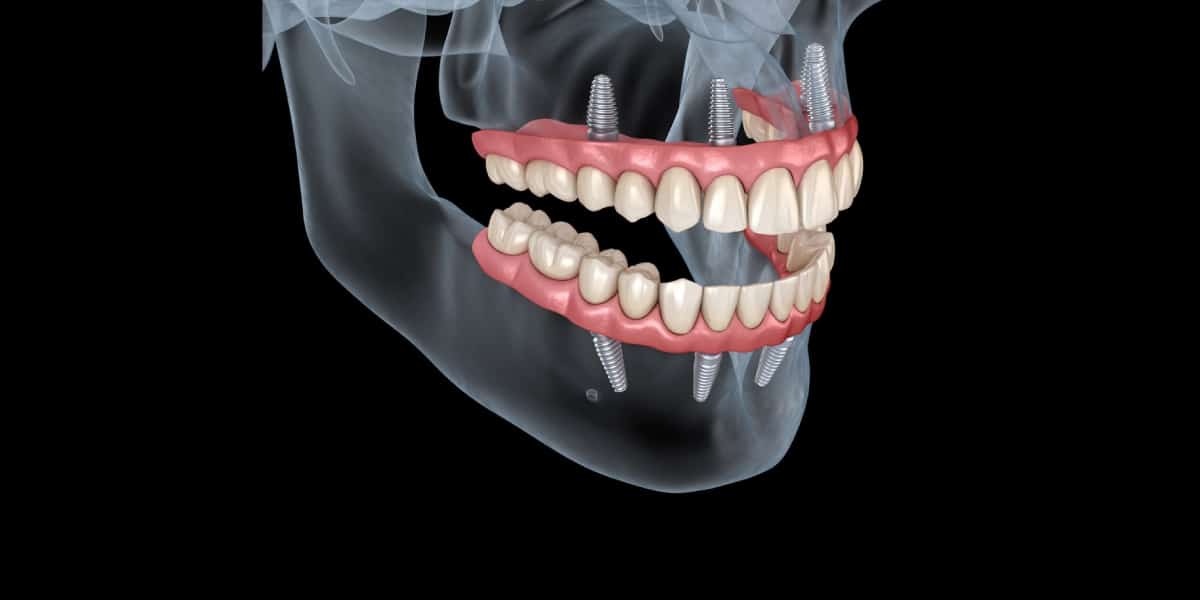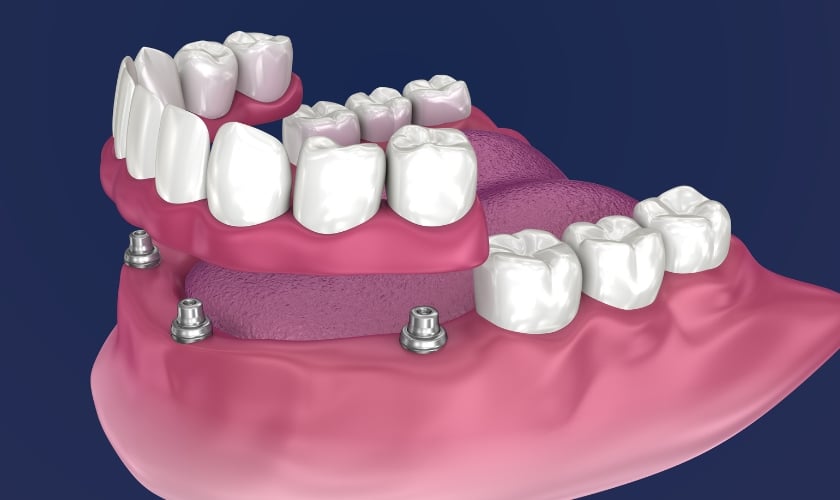All on 4 Implants vs. Dentures: Which is the Better Choice?

Choosing the right dental solution can feel overwhelming with so many options available. All on 4 implants and traditional dentures stand out as popular choices. But which one suits your needs best? Understanding the differences between these options helps you make an informed decision.
All on 4 implants offer a fixed, permanent solution that mimics natural teeth, while traditional dentures provide a removable and cost-effective alternative. Each option has unique benefits and drawbacks. This blog will guide you through the essentials of All on 4 implants and dentures, comparing aesthetics, comfort, costs, maintenance, and suitability for different lifestyles.
By the end, you’ll have a clear understanding of which dental solution aligns with your needs and lifestyle. Let’s explore these options to help you smile confidently again.
What are All on 4 implants?
All on 4 implants are a dental restoration method that replaces a full arch of missing teeth with only four implants. They utilize strategically placed implants to support a fixed dental bridge or denture.
How do they work?
- Between four and six implants are surgically placed into the jawbone, typically at angles, to maximize bone contact and stability.
- A custom-made prosthetic, usually a bridge or denture, is then securely attached to the implants.
Advantages of All on 4 implants
- Immediate Function: Patients can receive temporary teeth on the same day as implant placement.
- Bone Preservation: They help preserve jawbone density and prevent bone loss.
- Aesthetics and Functionality: Provides natural-looking teeth that function similar to natural teeth.
- Cost-Effectiveness: Often more cost-effective than individual implants for each missing tooth.
What are dentures?
- Dentures are removable dental prosthetics designed to replace missing teeth and surrounding tissues.
- They are custom-made to fit comfortably over the gums and are typically made from acrylic resin.
Types of dentures
- Complete Dentures: Replace all teeth in either the upper or lower jaw.
- Partial Dentures: Replace several missing teeth and attach to existing natural teeth with metal clasps or precision attachments.
Advantages of dentures
- Affordability: Generally more affordable than dental implants.
- Versatility: Suitable for varying degrees of tooth loss.
- Ease of Maintenance: Easy to clean and maintain oral hygiene.
- Restoration of Appearance and Function: Improves chewing ability and restores facial aesthetics.
Aesthetics of All on 4 implants vs. dentures
- Natural Appearance: All on 4 implants provide a natural-looking smile as they are fixed in place and mimic the appearance of natural teeth.
- Gum Line Appearance: They maintain the natural gum line, enhancing aesthetics.
Comfort and fit
- Stability: All on 4 implants are fixed in place and do not shift or move during eating or speaking.
- Custom Fit: They are custom-made to fit the contours of the mouth and jawbone, providing comfort similar to natural teeth.
Impact on speech and eating
- Speech: All on 4 implants typically do not affect speech clarity as they are stable and fixed in the mouth.
- Eating: They offer strong chewing power, allowing patients to eat a wide variety of foods comfortably without concerns about slippage or discomfort.
Initial costs of All on 4 implants vs. dentures
- All on 4 Implants: Initial costs for All on 4 implants are typically higher due to the surgical procedure and materials involved.
- Dentures: Dentures generally have a lower initial cost compared to implants due to the simpler fabrication process.
Long-term maintenance and care
- All on 4 Implants: Requires regular dental visits for check-ups and maintenance but generally requires less ongoing care compared to dentures.
- Dentures: Require regular adjustments, relining, and replacement due to wear and tear, which can increase long-term maintenance costs.
Durability and lifespan
- All on 4 Implants: Known for their durability, All on 4 implants can last a lifetime with proper care and maintenance.
- Dentures: Typically have a shorter lifespan compared to implants and may need replacement every 5-10 years, depending on usage and care.
Active lifestyles: Implants vs. dentures
All on 4 Implants:
- Ideal for active lifestyles as they are securely anchored in the jawbone, providing stability during physical activities.
- Allows for confident participation in sports and activities without the fear of dentures slipping or shifting.
Dentures:
- May pose challenges for active individuals due to potential movement or discomfort during vigorous activities.
- Require careful handling to prevent damage or displacement, which can limit participation in certain sports.
Dietary restrictions and eating habits
All on 4 Implants:
- No dietary restrictions; can comfortably bite and chew a wide variety of foods similar to natural teeth.
- Offers a more natural eating experience compared to dentures.
Dentures:
- Certain dietary restrictions may apply, especially hard or sticky foods that could dislodge or damage dentures.
- Requires adaptation to eating habits to ensure food is properly chewed and enjoyed.
Social and emotional impacts
All on 4 Implants:
- Enhances self-confidence and social interactions by providing a natural-looking smile and stable dental function.
- Minimizes embarrassment associated with denture maintenance or potential slippage in social settings.
Dentures:
- May affect self-esteem due to concerns about denture appearance or functionality in social situations.
- Requires regular maintenance and adjustment, which can impact social spontaneity.
Impact of oral health on choosing implants or dentures
All on 4 Implants:
- Require adequate bone density and healthy gums for successful placement and long-term stability.
- Ideal for patients with good overall oral health who seek a permanent solution for missing teeth.
Dentures:
- More forgiving of bone density issues and gum health compared to implants.
- Suitable for patients with varying levels of oral health, including those with moderate bone loss or gum disease.
Bone density and gum health
All on 4 Implants:
- Depend heavily on sufficient bone density to support implant placement and integration.
- Require healthy gums to minimize the risk of infection and ensure long-term success.
Dentures:
- Less reliant on bone density as they rest on the gums.
- Can be adjusted or relined to accommodate changes in bone structure over time.
Long-term oral health benefits
All on 4 Implants:
- Stimulate jawbone to prevent bone loss and maintain facial structure.
- Promote overall oral health by functioning like natural teeth, reducing the risk of gum disease and preserving adjacent teeth.
Dentures:
- Provide immediate restoration of aesthetics and function without the need for surgery.
- Require regular care and maintenance to prevent gum irritation, and fungal infections, and ensure longevity.
Factors to consider when choosing between implants and dentures
Implants:
- Consider if you prefer a permanent solution that feels like natural teeth.
- Evaluate your bone density and gum health to ensure suitability for implant placement.
- Factor in the initial investment for long-term benefits and reduced maintenance.
Dentures:
- Assess if you prefer a removable option that is easier to adjust and clean.
- Consider the impact on speech and eating, especially if you have specific dietary preferences.
- Evaluate the initial cost versus long-term maintenance expenses.
Consulting with a dentist
Implants:
- Schedule a consultation to assess your oral health and discuss treatment options.
- Receive personalized recommendations based on your specific dental needs and preferences.
Dentures:
- Consult with a dentist to determine the best type of denture (partial or full) for your case.
- Discuss adjustments and ongoing care to ensure comfort and functionality.
Personal preferences and lifestyle needs
Implants:
- Consider how implants align with your lifestyle, including dietary habits and oral hygiene routine.
- Evaluate the aesthetic benefits and improved self-confidence that implants can provide.
Dentures:
- Evaluate the convenience of removable dentures for daily care and maintenance.
- Consider how dentures fit into your social and professional life, including speaking and eating comfortably.
In weighing All on 4 implants versus dentures, each option offers unique advantages depending on your lifestyle, oral health, and preferences. Whether you prioritize longevity and natural feel with implants or seek affordability and ease of maintenance with dentures, consulting with your dentist is crucial. By considering factors like aesthetics, comfort, cost, and oral health implications, you can make an informed decision that enhances your quality of life and restores your smile confidently.




